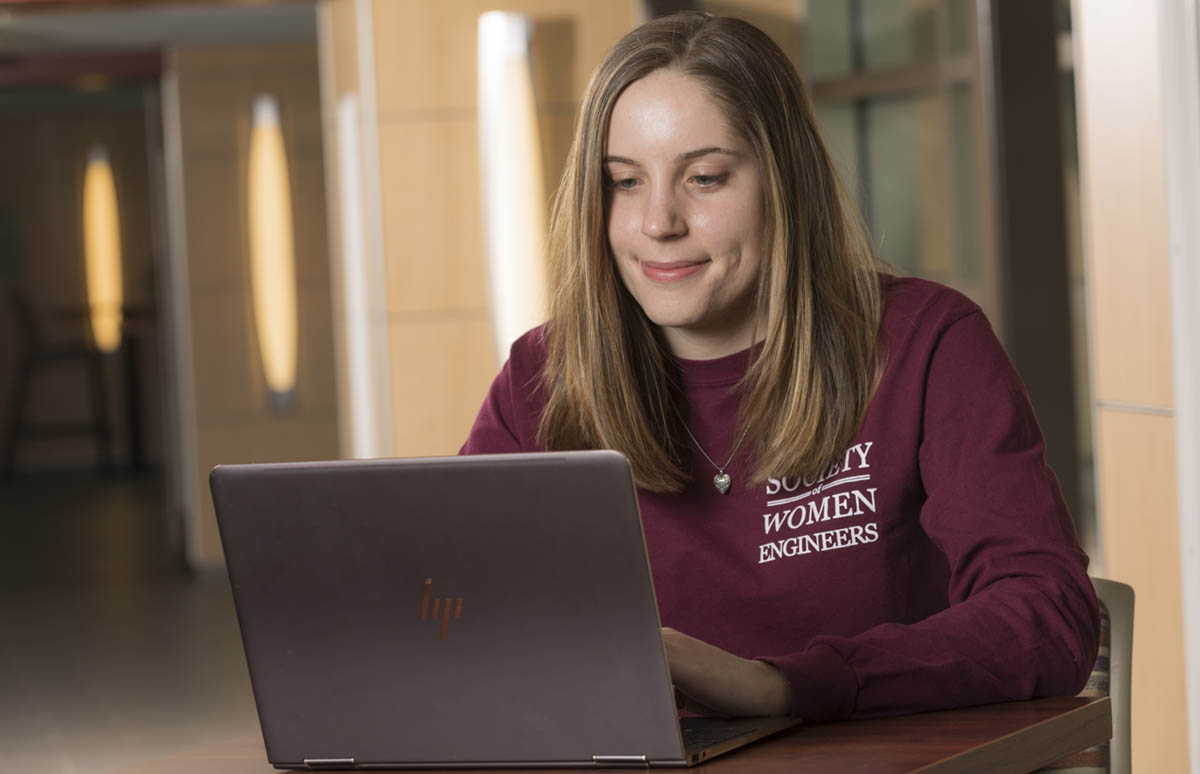Women-led student groups at Watson College are narrowing the STEM gender gap
Of 28 active student groups in 2020–21, 43% of those groups were led or co-led by women students

In her first year as a computer science student at Binghamton University, Theresa Gundel and three other women students created a game called Breaking the Glass Ceiling to shed light on gender inequality in the technology workforce.
Players start the game as women interns in a fictional organization composed of all men, who are disrespectful to the interns. Players must complete coding assignments (mini-games such as Snake or Brick Breaker) to earn promotions. With every promotion, players receive more respect from their men coworkers. Players win the game when they become CEO of the organization.
Developing the game earned Gundel and her team an award at that year’s hackathon, an annual event hosted by Watson College’s HackBU student group.
But winning isn’t why Breaking the Glass Ceiling means so much to the senior from Clifton Park, N.Y.
“I worked on that game with three girls, and three of us are now on the board for HackBU,” says Gundel, who is the organization’s president. “We started with a game that said, ‘Hey, there’s an inequality here,’ and now we have a board that is 50% women.”
Watson College has 28 active student groups, and in the 2020–21 academic year, 43% of those groups were led or co-led by women students.
“Having women-centered student organizations makes an incoming or prospective student feel comforted by showing them it won’t be impossible to find other women in the same situation,” says Megan DiBella, a biomedical engineering student and president of Watson’s section of the Society of Women Engineers (SWE).
Gundel says HackBU is open to anyone interested in technology who wishes to make friends and learn something new. Knowledge of coding isn’t necessary, and members don’t have to be computer science (CS) or even Watson College students. The group hosts weekly workshops that cover various CS topics (cloud computing, machine learning, data science and other upper-level subjects) in a way that makes them accessible for all, as well as weekly “hacky hours” where members play online games.
In addition, each year the group holds a 24-hour coding competition (hackathon). The event is always popular and draws corporate and University sponsors.
SWE, on the other hand, is primarily intended for Watson College students who wish to help empower women in STEM. And DiBella says students interested in transferring into Watson have approached the group to learn about engineering and what it’s like to be a woman in STEM.
On a national scale, SWE works to raise awareness of the importance of diversity within the engineering profession and to empower women to advance their engineering studies and careers. The group focuses on career services, professional development and networking opportunities. SWE also holds events including company tours, discussion panels and volunteering with Girl Scout troops.
For DiBella, a senior from Syracuse, N.Y., being part of SWE has been beneficial personally and professionally.
“The upperclassmen in SWE that I met as an underclassman were huge role models for me when I first came to Binghamton. I found mentors and then friends in many of them,” she says. “I have also met many engineering professionals through the greater SWE organization who have given amazing advice and inspiration.”
Gundel found her inspiration early and close to home — her mother is a software engineer.
“Going into engineering as a woman never really scared me or bothered me because my mom was able to do it,” she says.
It won’t be long before both Gundel and DiBella will join the 28% of women who make up the nation’s workforce in science, technology, engineering and math.
Following graduation, Gundel will be a firmware developer at IBM in Poughkeepsie, N.Y., while DiBella will be a manufacturing engineer at medical device manufacturer Medtronic in North Haven, Conn.
DiBella has SWE to thank for bringing her together with her future employer.
“It was at the 2019 National SWE Conference that I landed an internship with Medtronic for summer 2020, and despite that internship going virtual, I had a great experience,” she says. “I know I’ll face challenges, but I’m confident I can overcome these difficulties, especially with the SWE community supporting me.”
